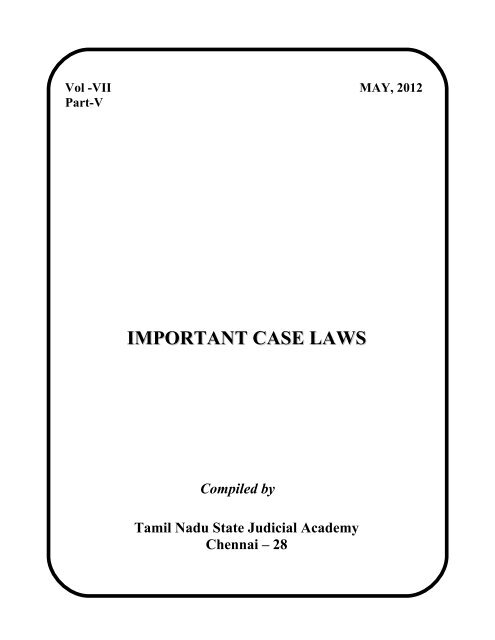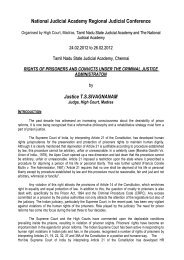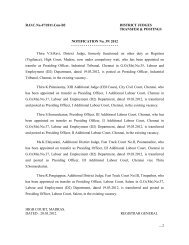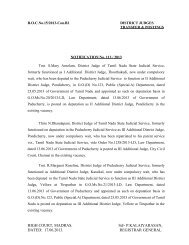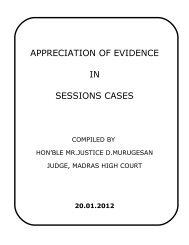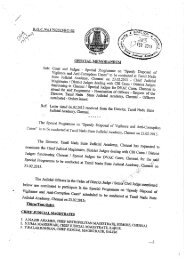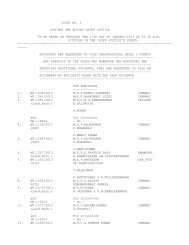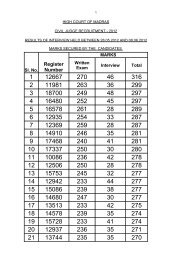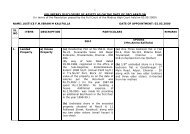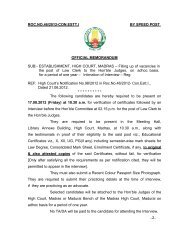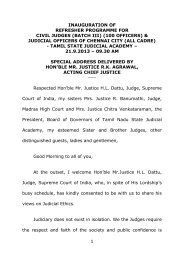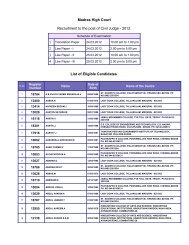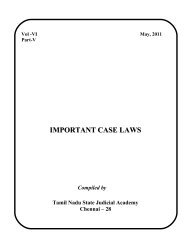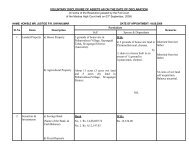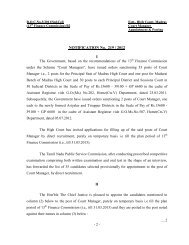May - Madras High Court
May - Madras High Court
May - Madras High Court
You also want an ePaper? Increase the reach of your titles
YUMPU automatically turns print PDFs into web optimized ePapers that Google loves.
Vol -VII MAY, 2012<br />
Part-V<br />
IMPORTANT CASE LAWS<br />
Compiled by<br />
Tamil Nadu State Judicial Academy<br />
Chennai – 28
INDEX<br />
S. NO. IMPORTANT CASE LAWS<br />
PAGE NO.<br />
1 Supreme <strong>Court</strong> - Civil Cases 01<br />
2 Supreme <strong>Court</strong> - Criminal Cases 05<br />
3 <strong>High</strong> <strong>Court</strong> - Civil Cases 06<br />
4 <strong>High</strong> <strong>Court</strong> - Criminal Cases 16<br />
i
TABLE OF CASES WITH CITATION<br />
SUPREME COURT CITATION OF CIVIL CASES<br />
SL.<br />
NO.<br />
CAUSE TITLE CITATION PAGE NO.<br />
1 Sanjeev Kumar Jain Vs Raghubir Saran Charitable Trust & Ors 2012 – 1- L.W. 49 1<br />
2 National Insurance Company Ltd Vs Sinitha & Ors 2012 – 1- L.W. 120 2<br />
3 Citicorp. Maruti Finance Ltd Vs S. Vijayalaxmi 2012 – 1- L.W. 153 3<br />
4 Bimal Kumar & Anr Vs Shakuntala Debi & Ors 2012 (2) CTC 881 3<br />
ii
SUPREME COURT CITATION OF CRIMINAL CASES<br />
SL.<br />
NO.<br />
CAUSE TITLE CITATION PAGE NO.<br />
1 Om Kr. Dhankar Vs State of Haryana & Anr 2012 (2) CTC 871 5<br />
iii
HIGH COURT CITATION OF CIVIL CASES<br />
S.NO CAUSE TITLE CITATION PAGE NO.<br />
1 Palanisamy. V Vs V. Shanmugam and Ors 2012 (3) CTC 6 6<br />
2 Pajus. P.R. (Debtor), Proprietor, P.R. Karuppaiah Nadar & Co. Trichy Vs P. Uma 2012 (3) CTC 25 6<br />
Maheswaran and Ors<br />
3 Gunalan. R and Anr Vs The State by Deputy Superintendent of Police, Vigilance and Anti- 2012 (3) CTC 38 6<br />
Corruption Dept, Erode Wing, Erode District<br />
4 Kasee Sah. P. B Vs P.T. Hiru Sah 2012 (3) CTC 48 7<br />
5 Chinnu Padayachi and Anr Vs Dhanalakshmi W/o. Thangavel and Ors 2012 – 1- L.W. 74 7<br />
6 Mohanasundaram. R & Ors Vs Arulmigu Kolavizhi Amman Temple, G.N. Chetty Street, 2012 – 1- L.W. 89 7<br />
Mylapore, Chennai – 4<br />
7 CRP (NPD) No.1162 of 2011:- Mr. R. Roopkumar Vs M/s. Rajiv Jewellers, represented by 2012-2-TLNJ 113 (Civil) 8<br />
its Prop. R. Jayakumar, Old No.8/84, New No. 78/2, Sir Thiyagaraya Road, T.Nagar,<br />
Chennai – 600 017 And CRP (NPD) No.4278 of 2011:- M/s. Rajiv Jewellers, represented<br />
by its Prop. R. Jayakumar, Old No.8/84, New No. 78/2, Sir Thiyagaraya Road, T.Nagar,<br />
Chennai – 600 017 Vs Mr. R. Roopkumar<br />
8 Sapna Vs B. Pradeep Kumar 2012-2-TLNJ 136 (Civil) 9<br />
9 Ramachandran Vs Govindasamy (died) and Ors 2012-2-TLNJ 158 (Civil) 9<br />
10 Venkatasubramaniya Chettiar (died) & Ors Vs Perumal Chettiar & Ors 2012 (3) CTC 160 9<br />
11 Ali. T, M/s Kohinoor Roller Flour Mills represented by its Managing Director, M.L.Road, 2012 – 1- L.W. 173 10<br />
Kottayam, Kerala State Vs M/s Koodal Industries Ltd., through one of its Directors Thiru. B.<br />
Sundarapandian, Door No.89, First Floor, South Avanimoola Street, Madurai – 625 001.<br />
12 Sulochana and Ors Vs Thilakavathi 2012 (3) CTC 178 10<br />
13 Lilly and Anr Vs Tamimul Ansari and Ors 2012-2-TLNJ 184 (Civil) 11<br />
14 Rukmani Ammal Vs Karuppa Gounder 2012-2-TLNJ 186 (Civil) 11<br />
15 The General Manager, Southern Railway, Chennai-3. and Ors Vs R. Thangaraja 2012 – 1- L.W. 189 11<br />
16 Thulasi Ammal and Ors Vs A. Sivakumar and Ors 2012-2-TLNJ 197 (Civil) 12<br />
17 Manoharan. K Vs T. Janaki Ammal and Ors And Janaki Ammal. T and Ors Vs K. 2012 (3) CTC 205 12<br />
Monoharan and Anr<br />
18 The Divisional Manager, The Oriental Insurance Company Ltd, Vellore Vs R. Malliga & Ors 2012 – 2- L.W. 216 13<br />
19 Shanthi & Anr Vs D. Venkataramanan 2012 – 2- L.W. 228 13<br />
20 Padmaja Ashok Vs Dr. E. Rajasree Cause title amended vide order of <strong>Court</strong> dt.9.6.2008 2012-2-TLNJ 244 (Civil) 14<br />
made in C.M.P.No.2995/07 and Ors<br />
21 Shanmugam and Ors Vs Lakshmiammal and Anr 2012-2-TLNJ 276 (Civil) 14<br />
22 Jagadeesan Vs T. Kriupakaran and Ors 2012-2-TLNJ 281 (Civil) 14<br />
23 Muthammal W/o Late Balu Chettiar and Ors Vs Indirani Ammal W/o P. Subramania 2012 – 2- L.W. 301 14<br />
Chettiar, Vanniar Street, Poonamallee Post, Chennai – 600 056<br />
24 Ponnuvel Nadar and Anr Vs Ghouse Bhasha 2012-2-TLNJ 327 (Civil) 15<br />
25 Manoharan Vs Thiruthuraipoondi Co-op, Urban Bank Ltd., E-603, rep by its Secretary.<br />
Thiruthuraipoondi post, Thiruvarur District.<br />
2012-2-TLNJ 329 (Civil) 15<br />
iv
HIGH COURT CITATION OF CRIMINAL CASES<br />
SL.<br />
NO.<br />
CAUSE TITLE CITATION PAGE NO.<br />
1<br />
Ramesh. M Vs The Inspector of Police, D-6 Anna Sequare Traffic<br />
Investigation, Chennai<br />
2012 (2) CTC 741<br />
16<br />
v
SUPREME COURT CITATIONS<br />
CIVIL CASES<br />
2012 – 1- L.W. 49<br />
Sanjeev Kumar Jain<br />
Vs<br />
Raghubir Saran Charitable Trust & Ors.<br />
C.P.C., Sections 35, 35B, Order XXA/Suit for Injunction, Temporary Injunction, vacating of, awarding costs,<br />
maximum costs, when can be awarded, Consent, Scope, ‘actual realistic costs’, what is,<br />
Arbitration and Conciliation Act (1996), Sections 11, 31/”Appoint”, meaning of, Terms and Conditions,<br />
Scope of,<br />
C.P.C., Order 39/Injunction, Temporary vacating of, Awarding costs, Scope,<br />
Practice and Procedure/’Awarding Costs’; what is.<br />
Held: Impugned order including the portion regarding costs, was not a consent order.<br />
<strong>Court</strong> could not have awarded costs exceeding the scale that was prescribed in the schedule to the Rules.<br />
Doing so would be contrary to the Rules – Chapter 11 Part C of the Delhi <strong>High</strong> <strong>Court</strong> Rules deals with award of<br />
costs in civil suits.<br />
By seeking consent of the parties to award litigation expenses as costs, the <strong>High</strong> <strong>Court</strong> could not have<br />
adopted the procedure of awarding what it assumed to be the ‘actual costs’.<br />
Nor could it proceed to award a sum of<br />
civil suit.<br />
45,28,000/- as costs in an appeal relating to an interim order in a<br />
There is no provision for award of ‘actual costs’ and the award of costs will have to be within the limitation<br />
prescribed by section 35.<br />
“Actual realistic cost” should have a correlation to costs which are realistic and practical – Even if actual<br />
costs have to be awarded, it should be realistic which means what a “normal” advocate in a “normal” case of such<br />
nature would charge normally in such a case.<br />
Mechanically ordering the losing party to pay costs of 45,28,000/- in an appeal against grant of a<br />
temporary injunction in a pending suit for permanent injunction was unwarranted and contrary to law – It cannot be<br />
sustained.<br />
Discretion vested in the courts in the matter of award of costs is subject to two conditions, as is evident<br />
from section 35.<br />
Maximum that can be awarded as compensatory costs in regard to false and vexatious claims is 3,000/- -<br />
Ceiling in regard to compensatory costs should be at least 1,00,000/-.<br />
The word ‘appoint’ in section 11 of the Act, refers not only to the actual designation or nomination as an<br />
arbitrator, but includes specifying the terms and conditions, which the Chief Justice or Designate may lay down –<br />
1
Whenever the Chief Justice or his Designate appoint arbitrator/s, it will be open to him to stipulate the fees payable<br />
to the arbitrator/s.<br />
Order of the <strong>High</strong> <strong>Court</strong>, to the extent it levies costs of 45,28,000/- on the appellant is set aside –<br />
Appellant shall pay the costs of the appeal before the <strong>High</strong> <strong>Court</strong> as per Rules plus 3000/- as exemplary costs to<br />
the respondents.`<br />
2012 – 1- L.W. 120<br />
National Insurance Company Ltd<br />
Vs<br />
Sinitha & Ors<br />
Motor Vehicles Act, (1988), Sections 140/’No fault’ liability, Principle, 144, 163A/’Fault Liability’; ‘No Fault<br />
Liability’; Distinction Principle of, Ingredients of Section 163A, Governed by ‘Fault’ liability Principle, Distinction<br />
between Fault and No-Fault liability; Fault, what is, ‘Wrongful act’; ‘Neglect’; ‘default’.<br />
Compensation payable under Section 163A of the Act was not as an interim measure, but was final.<br />
Compensation determined under Section 163A could not be in addition to a claim for further compensation<br />
under a separate provision governed by the “fault” liability principle – Nine points laid down in 2001-3-L.W.622(S.C.)<br />
Oriental Insurance Company Limited vs. Hansrajbhai V. Kodala, reiterated.<br />
Section 144 of the Act would not override mandate contained in Section 163A – Section 144 provided for<br />
such effect over provisions “for the time being in force”, i.e., the provisions then existing.<br />
Section 163A was not on the statute book at the time when Section 144 was incorporated therein – Section<br />
163A of the Act has overriding effect over all the provisions/sections.<br />
Claim made under Section 163A of the Act is whether a claim under the “fault” liability principle, or under<br />
the “no-fault” liability principle.<br />
If a claim for compensation under a provision, is not sustainable for reason of a “fault” on account of<br />
“wrongful act”, neglect” or “default”, the provision in question would be governed by the “fault” liability principle –<br />
If under a provision, a claimant does not have to establish, that his claim does not have to establish, that his claim<br />
does not arise out of “wrongful act” or “neglect” or “default”; the claim cannot be defeated on account of any of<br />
the aforesaid considerations; then the provision in question will fall under the “no-fault” liability principle.<br />
Section 140(4) reveals, that the claim of compensation under Section 140 of the Act cannot be defeated<br />
because of any of the “fault” grounds – Compensation claimed under Section 140 is governed by the “no-fault”<br />
liability principle.<br />
Section 163(A) sub-section (2) is in parimateria with sub-section (3) of Section 140 – As in Section 140, so<br />
also under Section 163A of the Act, it is not essential for a claimant seeking compensation, to “plead or establish”,<br />
that the accident out of which the claim arises, suffers from “wrongful act” or “neglect” or “default” of the<br />
offending vehicle – It is open to a concerned party (owner or insurer) to defeat a claim raised under Section 163A of<br />
the Act, by establishing “wrongful act”, “neglect” or “default”.<br />
Section 163A of the Act, catered to shortening the length of litigation, by introducing a scheme regulated<br />
by a pre-structured formula to evaluate compensation – Only proof of age of income, needs to be established by<br />
the claimant to determine the compensation in case of death.<br />
2
Section 163A of the Act has an overriding effect on all other provisions of the M.V. Act – It is open to the<br />
owner or insurance company, to defeat a claim under Section 163A of the Act by pleading and establishing a “fault”<br />
ground.<br />
3
2012 – 1- L.W. 153<br />
Citicorp. Maruti Finance Ltd<br />
Vs<br />
S. Vijayalaxmi<br />
Hire Purchase / Motor vehicle, Repayment default of, Taking over possession of vehicle, how to be<br />
effected, Consumer, Deficiency – Use of force impermissible,<br />
Consumer Protection Act/Complaint by hirer of vehicle under a Hire Purchase Agreement, against<br />
appellant-Financier Bank alleging deficiency of service.<br />
Agreement, against appellant-Financier Bank alleging deficiency of service.<br />
In case of mortgaged goods subject to Hire-Purchase Agreement, the recovery process has to be in<br />
accordance with law and not by use of force – Till such time as the ownership is not transferred to the purchaser,<br />
the hirer normally continues to be the owner of the goods – But that does not entitle him on the strength of the<br />
agreement to take back possession of the vehicle by use of force – Guidelines laid down by the Reserve Bank of<br />
India as well as the Appellant Bank itself, support and make a virtue of such conduct – If any action a virtue of such<br />
conduct – If any action is taken for recovery in violation of such guidelines or the principles as laid down by this<br />
<strong>Court</strong>, such an action cannot but be struck down.<br />
2012 (2) CTC 881<br />
Bimal Kumar & Anr<br />
Vs<br />
Shakuntala Debi & Ors<br />
Code of Civil Procedure, 1908 (5 of 1908), Section 2(2) & Order 23, Rule 3 – Partition Suit – Compromise<br />
Decree – Effect of – Clear stipulation in compromise entered into between parties that they were in separate and<br />
exclusive possession of properties and same had already been allotted to them – Also admitted that they were in<br />
possession of their respective shares and no final decree or execution was required to be filed – Parties absolutely<br />
conscious that their rights had been fructified and their possession had been exclusively determined – Parties well<br />
aware that decree was final in nature as their shares were allotted and nothing remained to be done by metes and<br />
bounds – Rights of parties had attained finality and no further inquiry from any spectrum was required to be carried<br />
out – Thus, whole thing had been embodied in decree passed on foundation of compromise – Decree based and<br />
passed on such compromise in entirety from all angles leaving` nothing to be done in future, is a final decree.<br />
Code of Civil Procedure, 1908 (5 of 1908), Section 2(2) & Order 23, Rule 3 – Partition Suit – Compromise<br />
Decree – Effect of – Clear stipulation in compromise entered into between parties that they were in separate and<br />
exclusive possession of properties – Section 2(2), Explanation – Decree – Preliminary or Final – <strong>May</strong> be both<br />
preliminary and final and that apart, a decree may be partly preliminary and partly final – Preliminary decree merely<br />
declares rights and shares of parties and leaves room for further inquiry to be held and conducted pursuant to<br />
directions made in preliminary decree which inquiry having been conducted and rights of parties finally determined<br />
a decree incorporating such determination is final decree.<br />
Limitation Act, 1963, (36 of 1963), Article 136 – Execution of compromise decree – Limitation – Application<br />
for execution of decree or order of any Civil <strong>Court</strong> to be filed within a period of twelve years – Compromise decree<br />
passed in 1964, attained status of final decree – No stay of earlier judgment or any proceedings emanating there<br />
from granted in subsequent Suit filed for partition and declaration that exparte compromise decree was null and<br />
void – In absence of any interdiction form <strong>Court</strong>, decree holder was entitled to execute decree – Nonetheless,<br />
execution case filed by decree holder in 2004 – Thus, initiation of Execution proceedings after 44 years, barred by<br />
limitation – Code of Civil Procedure, 1908, Section 2(2) & Order 23, Rule 3.<br />
4
Words and Phrases – “Compromise” – Means settlement of difference by mutual consent – In such<br />
process, adversarial claims come to a rest – Cavil between parties given a decent burial – Compromise, which is<br />
arrived at by parties, puts an end to litigative battle – It is a noble reciprocal settlement with clear mind – It signifies<br />
magnificent and majestic facets of human mind – Exalted state of affairs brings in quintessence of sublime<br />
solemnity and social stability.<br />
************<br />
5
SUPREME COURT CITATIONS<br />
CRIMINAL CASES<br />
2012 (2) CTC 871<br />
Om Kr. Dhankar<br />
Vs<br />
State of Haryana & Anr<br />
Code of Criminal Procedure, 1973 (2 of 1974), Section 197 – Indian Penal Code, 1860 (45 of 1860), Sections<br />
420, 409 & 427 – Offence of cheating by no stretch of imagination be committed by any public servant while acting<br />
or purporting to act in discharge of official duty – Thus, previous sanction of Competent Authority in relation to<br />
such offences would not be required under Section 197 of Code – Prakash Singh Badal v. State of Punjab, 2007 (1)<br />
SCC 1, relied upon.<br />
Code of Criminal Procedure, 1973 (2 of 1974) Section 397 – Order of Magistrate directing issuance of<br />
summons – Can be challenged by way of Revision under Section 397.<br />
**************<br />
6
HIGH COURT CITATIONS<br />
CIVIL CASES<br />
2012 (3) CTC 6<br />
V. Palanisamy<br />
Vs<br />
V. Shanmugam and Ors<br />
Code of Civil Procedure, 1908 (5 of 1908) Order 18, Rule 1 – Right to being – Evidence Act, 1872 (1 of 1872),<br />
Sections 101 to 103 – Burden of proof – Suit for Partition of family property – Defence of Defendant that properties<br />
already divided on basis of family arrangement who should begin – Person who pleads family arrangement<br />
whereby all properties were divided should prove same – Defendant having pleaded so should prove – Plaintiff<br />
cannot be expected to prove negative, as matter not covered by any documentary evidence and based on oral<br />
arrangement followed by conduct of parties – Thus, order of Lower <strong>Court</strong> directing Defendant to first open case by<br />
getting into box, not interfered with.<br />
2012 (3) CTC 25<br />
P.R. Pajus (Debtor), Proprietor, P.R. Karuppaiah Nadar & Co. Trichy<br />
Vs<br />
P. Uma Maheswaran and Ors<br />
Code of Civil Procedure, 1908 (5 of 1908), Order 18, Rule 1 – Right to begin – Evidence Act, 1872 (1 of 1872),<br />
Sections 101 to 103 – Burden of proof – Onus of proof – Insolvency petition – Application to direct<br />
Debtor/Respondent to first adduce evidence to prove that properties available in his hands sufficient to discharge<br />
his liabilities – Held, initial burden always on Petitioner to get into witness box and to speak about money<br />
transaction and make out his case as pleaded in Petition – Only when said initial burden is discharged, Respondent<br />
can be asked to make out his case – Held, mere averments in Petition that Debtor had transferred property in order<br />
to defeat Creditors not enough to invoke provision – Thus, order of Insolvency <strong>Court</strong> directing Respondent to first<br />
enter witness box factually and legally unsustainable and thus, set aside.<br />
2012 (3) CTC 38<br />
R. Gunalan and Anr<br />
Vs<br />
The State by Deputy Superintendent of Police, Vigilance and Anti-Corruption Department, Erode Wing, Erode<br />
District<br />
Indian Evidence Act, 1872 (1 of 1872) Independent Witness – Necessity in trap cases – Unless there is<br />
corroboration in material particulars evidence of bribe giver cannot be accepted – Mere recovery of tainted money<br />
not sufficient to convict accused – When there are serious contradictions in evidence, prosecution case cannot be<br />
accepted by mere picking a sentence or two from evidence.<br />
Prevention of Corruption Act, 1988 (49 of 1988), Section 19 – Sanction for Prosecution – Not an idle<br />
formality – To be strictly complied with before any prosecution is launched – Irregularity in procedure not a ground<br />
for setting aside conviction unless such irregularity had resulted in failure of justice to accused – Burden on<br />
prosecution to prove that sanction accorded was valid.<br />
7
2012 (3) CTC 48<br />
P. B. Kasee Sah<br />
Vs<br />
P.T. Hiru Sah<br />
Code of Civil Procedure, 1908 (5 of 1908), Order 14, Rule 1 & 3 – Pleadings in Written Statement – Issue<br />
whether to be framed in that regard? – Suit for mandatory injunction – Specific plea raised by Defendant in Written<br />
Statement that Suit for injunction not maintainable without seeking relief of declaration – However, no issue framed<br />
to that regard – Held, when such specific plea was raised, relevant issue ought to have been framed – Object of an<br />
issue is to bring down evidence, arguments and decision to a particular question so that there may be no doubt as<br />
to what dispute is – Issues are framed for arriving at right decision of case and to pin-point real and substantial<br />
points of difference – Pleadings of parties to be reflected in issues framed – Thus, two additional issues framed.<br />
Tamil Nadu <strong>Court</strong> Fees and Suits Valuation Act, 1995 (T.N. Act 14 of 1955), Sections 12(2) & 25(a) – Code of<br />
Civil procedure, 1908 (5 of 1908), Order 14, Rule 2 – Suit for Mandatory Injunction – Suit transferred from City Civil<br />
<strong>Court</strong> to <strong>High</strong> <strong>Court</strong> – Objection raised regarding valuation and correctness of <strong>Court</strong> fees – No limit to pecuniary<br />
jurisdiction of <strong>High</strong> <strong>Court</strong> – Thus, issue regarding valuation and correctness of <strong>Court</strong>-fees need not be determined<br />
as preliminary issue but can be decided along with other issues.<br />
2012 – 1- L.W. 74<br />
Chinnu Padayachi and Anr<br />
Vs<br />
Dhanalakshmi W/o. Thangavel and Ors<br />
C.P.C., Order 6, Rule 17/Amendment seeking Mandatory Injunction, when can be allowed,<br />
Limitation Act (1963), Article 113, Section 22/Continuous offence, what is.<br />
An application was filed by the respondents for amendment of the pleadings, incorporating the prayer for<br />
mandatory injunction – Respondents have stated that after filing of the suit, the petitioners herein have put up the<br />
said construction – It is not stated, when such construction was put up, even though it is stated that after filing of<br />
the suit – Hence, the relief of mandatory injunction cannot be entertained.<br />
Construction in the common passage, cannot be considered as a continuous breach, which will entitle the<br />
respondents to file application for amendment, even after the prescribed period of three years – Amendment<br />
sought for by the respondents barred by limitation.<br />
2012 – 1- L.W. 89<br />
R. Mohanasundaram & Ors<br />
Vs<br />
Arulmigu Kolavizhi Amman Temple, G.N. Chetty Street, Mylapore, Chennai - 4<br />
Tamil Nadu Hindu Religious and Charitable Endowments Act (1959), Sections 23, 29, 47 (Tamil Nadu<br />
Amendment Act 28 of 2003), Section 109, Substituted Section applies to pending suits, Suit for recovery of<br />
possession, declaration of title when needed.<br />
Limitation Act (1963), Section 10/Applicability to Religious institutions,<br />
Adverse possession/Claim by Poojaris-in-charge of temple, whether maintainable,<br />
Trusts, Limitation, Adverse Possession.<br />
Suit filed for recovery of Possession by Respondent-plaintiff temple (-arulmingu Kolavizhiammal temple)<br />
Mylapore, Chennai was decreed and reported in 2008-3-L.W. 1083-Appeal was preferred by defendants against that.<br />
8
Held: Plaintiff temple has established that it has got title by grant made by the Government – Defendants were<br />
only in-charge of the temple in their capacity as poojaris and managers of the temple and that they do not have any<br />
legal right to be in possession of the suit property – Plaintiff temple is entitled for recovery of possession.<br />
Defendants 1 to 4 have been in possession and enjoyment of the suit property as poojaris and defacto<br />
trustees of the plaintiff temple and not in possession of the suit property in their own right as owners.<br />
Only when a cloud is cast on the title, there is a need to file the suit for declaration – A cloud upon title is<br />
an apparent defect in it – In the instant case, defendants 1 to 4 and their ancestors have been held to be<br />
poojaris/Archakas, who were performing poojas and in management of the temple – There was no necessity for the<br />
plaintiff temple to seek for declaration of title.<br />
Even though no specific trust/endowment has been produced, the very purpose of grant would show that<br />
the property is intended for the purpose of the temple establishing that it is a religious endowment – In the case of<br />
religious and charitable endowment of Hindus and Muslims, for the purpose of Section 10, the endowed property<br />
should be regarded as property vested in Trust for a specific purpose and the Manager thereof as a trustee.<br />
For applicability of Section 10 – There must be property which has become vested in a person in trust for a<br />
specific purpose; The suit must be against such person or his legal representatives or assigns not being assigned<br />
for valuable consideration; The suit must be for the purpose of following in the hands of such person the trust<br />
property or its proceeds or for an account of such property or proceeds.”<br />
Archakas cannot acquire rights in the lands of the temple to which the grant was made because the<br />
Archakas should be deemed to be in possession in a fiduciary capacity and as such they cannot claim right –<br />
Defendants 1 to 4 and their ancestors were only managers of the temple and the properties and therefore the<br />
plaintiff temple has rightly invoked Section 10.<br />
Conducting of poojas and ceremonies and upkeep of the temple satisfy the of Section 10 and the ancestors<br />
of the appellants, being in-charge of the temple as Managers/Trustees, plaintiff temple has rightly invoked Section<br />
10.<br />
Plaintiff temple has been dealing with the property – Appellants are not right in contending that the suit<br />
property became vested in them prior to the cut-off date i.e., 30 th September 1951 and invoking the unamended<br />
Section 109 of H.R, & C.E, Act cannot be countenanced.<br />
Section 109 makes it clear that the entire provisions of the Limitation Act, 1963 shall not apply to any suti<br />
for possession of immovable property belonging to any religious institution.<br />
Substituted Section 109 of H.R. & C.E. Act will apply even for the pending suits – Archakas/trustees cannot<br />
claim adversely to the temple and acquire proprietary rights in the lands of the temple, where patta stands in the<br />
name of the plaintiff.<br />
2012-2-TLNJ 113 (Civil)<br />
CRP (NPD) No.1162 of 2011:- Mr. R. Roopkumar<br />
Vs<br />
M/s. Rajiv Jewellers, represented by its Prop. R. Jayakumar, Old No.8/84, New No. 78/2, Sir Thiyagaraya Road,<br />
T.Nagar, Chennai – 600 017.<br />
And<br />
CRP (NPD) No.4278 of 2011:- M/s. Rajiv Jewellers, represented by its Prop. R. Jayakumar, Old No.8/84, New No.<br />
78/2, Sir Thiyagaraya Road, T.Nagar, Chennai – 600 017.<br />
Vs<br />
Mr. R. Roopkumar<br />
Tamil Nadu Buildings (Lease and Rent Control) Act 1960, Section 25 – The plea of the tenant that in the<br />
appeal filed by the tenant for redetermining the fair rent, cannot be countenanced courts have consistently held<br />
9
that in matters relating to fixation of fair rent – the Rent Controller can fix higher fair rent than what was claimed –<br />
CRP 1162 of 2011 is allowed / CRP 4278, 4279/11 is dismissed.<br />
2012-2-TLNJ 136 (Civil)<br />
Sapna<br />
Vs<br />
B. Pradeep Kumar<br />
Hindu Marriage Act 1955, Section 13(1)(a) – Wife sought divorce on the ground of cruelty – Family <strong>Court</strong><br />
Chennai as trial court dismissed wife’s petition – on appeal <strong>High</strong> <strong>Court</strong> expressed that treating wife as a servant<br />
maid and forced to do all household works including washing the clothes of all family members of husband’s family<br />
also amounts of mental cruelty and view of trial court in this regard set aside – (Para 33) – held that wife entitled to<br />
relief of decree of divorce – permanent alimony ordered to be paid – CMA allowed.<br />
2012-2-TLNJ 158 (Civil)<br />
Ramachandran<br />
Vs<br />
Govindasamy (died) and Ors<br />
Civil Procedure Code 1908 as amended, Order 34, Rule 1 – Suit for reemption of property mortgaged by an<br />
usufructory mortgage – alleged that for more than 10 years mortgagee in possession and therefore claimed as<br />
mortgage discharged-defendant objected that all the legal heirs of original owner of the property not impleaded –<br />
trial court dismissed suit as the transaction was a conditional sale and for non joinder of necessary parties –<br />
confirmed by the appellate court-on second appeal the <strong>High</strong> <strong>Court</strong> opined that when some legal representatives file<br />
a suit for redemption, it is sufficient and suit not to be dismissed merely for non non joinder of such parties as<br />
necessary parties (Para 18) – Second appeal allowed.<br />
Interpretation of documents – Civil Procedure Code 1908 as amended, Order 34, Rule (Para 20).<br />
2012 (3) CTC 160<br />
Venkatasubramaniya Chettiar (died) & Ors<br />
Vs<br />
Perumal Chettiar & Ors<br />
Registration Act, 1908 (16 of 1908), Sections 17 & 49 – Transfer of Property Act, 1882 (4 of 1882) – Suit for<br />
Partition filed by one brother against other brother – Defendant claiming that properties were already divided under<br />
an unregistered Partition Deed – Plaintiff contending that rights in praesenti were created in unregistered Partition<br />
Deed and therefore, same cannot be relied on in evidence – Copy of unregistered Partition Deed eschewed by Trial<br />
<strong>Court</strong> on ground that it cannot be looked into for any purpose – Suit decreed – Appeal by Defendant – Unregistered<br />
Partition Deed could be looked into for collateral purpose of proving division in status and subsequent separate<br />
enjoyment of parties, in a Suit for Partition – Trial <strong>Court</strong> was not correct in rejecting unregistered Partition Deed,<br />
under which properties were divided – Trial <strong>Court</strong> is not correct in eschewing unregistered Partition Deed –<br />
Impugned Judgment set aside – Matter remitted with direction that Trial <strong>Court</strong> should consider unregistered<br />
Partition Deed for collateral purpose of proving division in status and possession of parties.<br />
Code of Civil Procedure, 1908 (5 of 1908), Order 41, Rule 27 – Application for receipt of additional<br />
documents filed at stage of Appeal – Parties cannot be allowed to fill up their lacuna or fill up their omissions –<br />
Provisions are not intended to allow litigants to patch up weak points – Additional documents are relevant for<br />
determination of issues arising between parties – Parties have not grasped significance of producing documents<br />
before Trial <strong>Court</strong> – Hence, additional evidence cannot be refused to be received – Application allowed – Trial <strong>Court</strong><br />
to consider additional documents – Appeal allowed.<br />
10
2012 – 1- L.W. 173<br />
Mr. T. Ali, M/s Kohinoor Roller Flour Mills represented by its Managing Director,<br />
M.L.Road, Kottayam, Kerala State<br />
Vs<br />
M/s Koodal Industries Ltd., through one of its Directors Thiru B. Sundarapandian,<br />
Door No.89, First Floor, South Avanimoola Street, Madurai – 625 001.<br />
C.P.C., Section 34/Interest, Compound Interest,<br />
Contract Act (1872), Section 72 Illusration (n),<br />
Tamil Nadu <strong>Court</strong> Fees and Suits Valuation Act (1955), Section 22.<br />
Suit was filed by the Respondent/Plaintiff against Appellant/Defendant for recovery of money –<br />
Appellant/Defendant has paid the entire principal amount due to the Respondent/Plaintiff – Only for the interest<br />
amount, the suit has been laid by the Respondent/Plaintiff – In order to become a money suit, a specific amount<br />
must be claimed in the suit – Since the entire principal amount due to the Respondent/Plaintiff has been paid by the<br />
Appellant/Defendant, the claim for interest made by the Respondent/Plaintiff is a money suit as per Section 22 – But<br />
the Respondent/Plaintiff comes out with a plea that interest has been orally agreed between the parties but failed to<br />
prove the said plea before this <strong>Court</strong> – Claim for interest is not based on any contract and as such the claim for<br />
interest in the plaint cannot be allowed.<br />
When there is no written contract between the parties to the payment of compound interest and when the<br />
plea that it has been agreed between the parties has been negative by this <strong>Court</strong> then the Respondent/Plaintiff<br />
cannot claim compound interest merely because the transaction is commercial in nature.<br />
2012 (3) CTC 178<br />
Sulochana and Ors<br />
Vs<br />
Thilakavathi<br />
Hindu Succession Act, 1956 (30 of 1956), Section 15 – Appeal arising out a Suit for Partition – Right over<br />
property of mother – Whether widow of pre-deceased son is entitled to share – Widow of a predeceased son is not<br />
a legal heir – Without establishing Will in question, daughters are entitled to entire share of mother to exclusion of<br />
widow of pre-deceased son – Consequent to death of mother, her entire share devolved upon her two daughters,<br />
who happened to be beneficiaries under Will also.<br />
Code of Civil Procedure, 1908 (5 of 1908), Section 11 & Order 9, Rule 9 – Partition Suit – Earlier Suit for<br />
Partition was dismissed as settled out of <strong>Court</strong> – Question whether subsequent Suit for Partition is barred by resjudicata<br />
– Simply because a Partition Suit was dismissed earlier for default or as settled out of <strong>Court</strong>, co-sharers<br />
are not precluded from instituting a fresh Suit for partition, if in reality no settlement got fructified – Compromise<br />
decree stands on a different footing – One should not get perplexed by indulging in making false analogy between<br />
compromise decrees and Suits dismissed as settled out of <strong>Court</strong> – Defendant, who pleads that amounts were paid<br />
to Plaintiffs pursuant to dismissal of earlier Suit, had not established same – Plea relating to amicable partition put<br />
forth by Defendant is nothing but a hill of beans fraught with mendacity and falsity – Suit not barred.<br />
Limitation Act, 1963 (36 of 1963), Article 65 – Code of Civil Procedure, 1908 (5 of 1908) – Adverse<br />
Possession – Possession by one co-owner amounts to possession by other co-owner – To attract ouster, a clear<br />
proof to demonstrate and display that the co-owner in possession started enjoying property as his own to<br />
detriment to interest of co-sharers not in possession – But no evidence to show that right of Plaintiff’s was ousted.<br />
11
2012-2-TLNJ 184 (Civil)<br />
Lilly and Anr<br />
Vs<br />
Tamimul Ansari and Ors<br />
Civil Procedure Code 1908 as amended, Order 1, Rule 10 (2) – Suit for partition dismissed for default –<br />
Property subsequently purchased by third party – suit restored and decreed later and preliminary decree passed –<br />
during pendency of final decree proceedings petition filed by third party purchaser to implead himself as a party to<br />
the proceedings – opposed as hit by doctrine of lis pendence – allowed by trial court and on revision <strong>High</strong> <strong>Court</strong><br />
expressed that as on the date of purchase of the property, no suit was pending and therefore it cannot be stated<br />
that the purchase was hit by doctrine of lis pendens – (para 5) trial court ordered confirmed on revision – CRP<br />
dismissed.<br />
2012-2-TLNJ 186 (Civil)<br />
Rukmani Ammal<br />
Vs<br />
Karuppa Gounder<br />
Adverse possession – Suit for declaration and injunction claiming title on adverse possession – trial court<br />
decreed suit but appellate court reversed the finding – on further appeal <strong>High</strong> <strong>Court</strong> held that possession of one co<br />
owner does not necessarily become possession of an alien – further under article 64 and 65 Limitation Act long<br />
possession is not necessarily an adverse possession unless accompanied by open assertion of title – has to be<br />
pleaded and proved the date of commencement, nature of possession, knowledge of real owner etc. – findings of<br />
appellate court confirmed – Second Appeal dismissed.<br />
2012 – 1- L.W. 189<br />
The General Manager, Southern Railway, Chennai-3. and Ors<br />
Vs<br />
R. Thangaraja<br />
Hindu Marriage Act, (1955), Sections 5, 16/Legitimacy of children of void and voidable marriage/Child born<br />
out of wedlock during subsistence of first marriage, Right of.<br />
Words and Phrases/’Legitimate’.<br />
Question in this Second Appeal is whether a <strong>Court</strong> under Section 16(1) of the Hindu Marriage Act, 1955,<br />
can legitimate a son, born before the marriage of his parents and when the first marriage of the father of the child<br />
with another person, was subsisting, when the child was born.<br />
Plaintiff (Head Constable in R.P.F.) filed the suit to declare that TM was his legitimate son and KM was his<br />
wife and sought for a direction to the defendants (Southern Railway) to include KM and TM, in his official records,<br />
as his legally wedded wife and his legitimate son.<br />
Trial <strong>Court</strong> granted a decree of declaration that TM is the legitimate son of the plaintiff and mandatory<br />
direction was also granted to include the names of both KM and TM, as wife and son – Lower appellate <strong>Court</strong><br />
confirmed the decision – Defendants preferred this Second Appeal.<br />
Plaintiff had married ‘MT’ (1 st wife) and filed a petition in the Family <strong>Court</strong> for divorce – During the<br />
subsistence of the marriage, he seems to have developed illicit intimacy with KM and had begotten a child even<br />
before the filing of the Divorce Petition – Appellant-a-Head Constable in the Railway Protection Force,<br />
apprehending disciplinary action that the was having illicit relationship, with KM, during the subsistence of the 1 st<br />
marriage with MT, had not disclosed the above fact to the department.<br />
12
Under Section 16 legitimacy of the child is determined on the basis of marriage, whether valid or void or<br />
voidable.<br />
Section 16 does not deal with the rights of children born through concubinage, but deals with legitimacy of<br />
the children born through void or voiable marriage.<br />
Concept of acknowledgment of paternity available in Mohammedan Law, cannot be imported to Hindus –<br />
To attract Section 16 of the Act, there should be a marriage.<br />
Both plaintiff and his second wife, have deposed that there was no marriage, when the child was born.<br />
Intention of the legislature in engrafting a rule of legal fiction in ordaining the children, though illegitimate,<br />
to be treated as legitimate, is confined only to a case, where there is a void or voidable marriage and not in the<br />
case, where there is no marriage at all – It is also settled legal position, while interpreting a provision, the <strong>Court</strong><br />
cannot re-legislate on the subject against the will expressed in the enactment.<br />
Both the <strong>Court</strong> below have erred in applying Section 16(1) of the Hindu Marriage Act, in declaring the<br />
legitimacy of the child born to the plaintiff and KM, not through a wedlock and during the subsistence of the first<br />
marriage of the plaintiff.<br />
2012-2-TLNJ 197 (Civil)<br />
Thulasi Ammal and Ors<br />
Vs<br />
A. Sivakumar and Ors<br />
Civil Procedure Code 1908 as amended, Section 3(1) – Suit for partition – plaintiffs claimed share on the<br />
property already sold to one of the defendants on the allegation that sale is not valid – trial court preliminary decree<br />
for partition – on appeal the defendant contended that the suit was bared by limitation and was not considered by<br />
trial court – the <strong>High</strong> <strong>Court</strong> expressed that the office of the trial court must be more vigilant and act as a sentinel<br />
quivive to check every suit before it is within the period of limitation as contemplated under the act and place a<br />
report before the trial judge when it is admitted and felt that nowadays courts not following the procedure (para 43)<br />
– further held that plea of limitation can not be raised at the appellate stage when not raised in trial court – but held<br />
that alleged sale is valid and binding and made to clear family debts – (para 67) plaintiff not entitled to question the<br />
same – Appeal Suit allowed with regard to certain items of properties.<br />
2012 (3) CTC 205<br />
K. Manoharan<br />
Vs<br />
T. Janaki Ammal and Ors<br />
And<br />
T. Janaki Ammal and Ors<br />
Vs<br />
K. Monoharan and Anr<br />
Specific Relief Act, 1963 (47 of 1963), Section 16(c) – Suit for Specific Performance – Total Sale<br />
consideration fixed as 42,66,000/- - Amount of 25,00,000/- paid as advance – Balance of 17,66,000/- to be paid<br />
within 21/2 months from date of Agreement – Purchaser has to prove his continuous readiness and willingness to<br />
perform his part of contract from date of contract till date of hearing – Mere pleadings is not enough – Purchaser<br />
had paid 25,00,000/- as advance and deposited balance sale consideration of 17,66,000/-, on date of filing of<br />
Suit itself – It cannot be stated that purchaser was not ready and willing to perform his part of contract – Purchaser<br />
was always ready and willing to perform his part of contract – He is entitled to decree for Specific Performance.<br />
13
Evidence Act, 1872 (1 of 1872), Sections 91 & 92 – When terms of transaction are reduced into writing, it is<br />
not possible to lead evidence to contradict its terms – As between parties to an instrument, oral evidence of<br />
intention is not admissible for purpose of either construing deed or proving intention of parties – Evidence<br />
adduced to prove oral Agreement between parties, for allotment of six plots for Defendants, in no way contradicts<br />
or varies with terms of Agreement of Sale – Hence, evidence adduced to establish oral Agreement for allotting six<br />
plots is admissible in evidence and not in contravention of Sections 91 & 92.<br />
Transfer of Property Act, 1882 (4 of 1882), Section 53-A – Registration Act, 1908 (16 of 1908), Section 17(1-<br />
A) – There is a clause in Agreement of Sale to effect that possession was handed over to Plaintiff for forming a<br />
layout – Trial <strong>Court</strong> held that since possession was handed over to Plaintiff, Agreement for Sale need to be<br />
registered – Whether Agreement for Sale referring to instance of delivery of possession, requires registration –<br />
Only when Agreement for Sale, which speaks about delivery of possession, is filed to claim benefit of part<br />
performance, <strong>Court</strong> has to find whether document is registered or not – When document is not registered then<br />
benefit of Section 53-A cannot be claimed – Since Plaintiff is not seeking protection or claiming benefit under<br />
Section 53-A, and seeks only permanent injunction restraining alienation of suit property, it is a relief independent<br />
of clause of handing over possession – Hence, there is no embargo for Plaintiff to rely upon Agreement of Sale –<br />
Finding of Trial <strong>Court</strong> that Agreement of Sale is invalid, set aside – Judgment of Single Judge in AIR 2009 <strong>Madras</strong><br />
110 approved – Impugned judgment and decree set aside – Appeal allowed in part.<br />
2012 – 2- L.W. 216<br />
The Divisional Manager, The Oriental Insurance Company Ltd, Vellore<br />
Vs<br />
R. Malliga & Ors<br />
Motor Vehicles Act (1988), Section 149(2)/ Breach of policy condition, ‘ pay and recover’; Scope of.<br />
Insurer can validly defend the proceedings initiated against in it on the premise that the owner of the<br />
vehicle has committed breach of the conditions by entrusting the vehicle to a person, who is not duly licensed –<br />
When the Insured himself placed the vehicle in charge of a person who does not hold a driving licence, it can be<br />
said that he is guilty of breach of the promise that the vehicle will be driven by a licensed driver.<br />
Respondent was not having a valid driving licence to drive the vehicle at the time of the accident.<br />
There is a clear breach of the specified conditions of the policy as referred to in Section 149(2) (a) (ii) –<br />
Insurer has discharged its burden – Owner of the vehicle alone is liable to pay the compensation.<br />
Claimants are the daughter and son of the deceased and they are in a state of penury – Insurance<br />
Company to pay the compensation awarded and recover it from the owner of the vehicle.<br />
2012 – 2- L.W. 228<br />
Tmt. Shanthi & Anr<br />
Vs<br />
D. Venkataramanan<br />
C.P.C., Order 17, Rules 2,3, Constitution of India, Article 227.<br />
Held: If the Judgment and Decree are passed exparte, it is open to the parties either to file an application under<br />
Order 9 Rule 13 of CPC., to set aside the exparte decree or to file a regular first appeal against the said judgment<br />
and Decree – Revision is not maintainable – Judgment and Decree passed by the learned District Munsif, Ambattur<br />
can only be construed as an exparte decree and it cannot be construed as a Judgment on merits.<br />
14
2012-2-TLNJ 244 (Civil)<br />
Padmaja Ashok<br />
Vs<br />
Dr. E. Rajasree Cause title amended vide order of <strong>Court</strong> dt.9.6.2008 made in C.M.P.No.2995/07 and Ors<br />
Adverse Possession – Property was settled by the aunt of the 1 st plaintiff’s husband during his minority –<br />
Plaintiff’s father in law was managing the estate of the plaintiff’s husband – plaintiff’s husband died and plaintiff<br />
claimed property as legal heir – father in law refused and claimed that the property is in his name in the revenue<br />
records – therefore suit for declaration and delivery of possession filed but father in law of plaintiff died during<br />
pendency of the suit – legal heirs impleaded and suit decreed – on appeal contended that power of attorney without<br />
proper stamp duty was admitted – further father in law prescribed title by adverse possession and all his legal heirs<br />
are entitled to share – <strong>High</strong> <strong>Court</strong> considering the facts and legal position held that there was no adverse<br />
possession by father against his son and was acting only in trust on behalf of son (para 17-19) – further held that<br />
documents not properly stamped once admitted in evidence cannot be challenged at any stage before the same<br />
court – but penalty can be imposed (para 25 & 28) – procedure followed by trail court condemned (para 15) trial<br />
court finding confirmed and appeal suit dismissed with direction.<br />
Indian Stamp Act 1899, Section 35, 38 and 61 – See Adverse Possession (para 17-19).<br />
2012-2-TLNJ 276 (Civil)<br />
Shanmugam and Ors<br />
Vs<br />
Lakshmiammal and Anr<br />
Partition – Suit filed for recovery of property on the basis of an alleged will – property already settled by the<br />
original owner in favour of another – trial court dismissed suit and appellate court confirmed dismissal of suit – on<br />
further appeal <strong>High</strong> <strong>Court</strong> also felt that the suit is bad for partial partition – also felt that after parting with the rights<br />
on the property by a settlement, the settler has no competency to deal with same property and plaintiff cannot<br />
claim any right on the said property (para 9) – Second Appeal dismissed.<br />
2012-2-TLNJ 281 (Civil)<br />
Jagadeesan<br />
Vs<br />
T. Kriupakaran and Ors<br />
Civil Procedure Code 1908 as amended, Order 41, Rule 27 – Petitions filed to receive certain documents as<br />
additional evidence and to adduce additional evidence were dismissed by the lower appellate <strong>Court</strong> independently<br />
before hearing the appeal – CRP filed in <strong>High</strong> <strong>Court</strong> – held the lower appellate <strong>Court</strong> committed error in dismissing<br />
the application independently without deciding the appeal on merits – order of lower appellate <strong>Court</strong> set aside –<br />
CRP allowed with direction.<br />
2012 – 2- L.W. 301<br />
Muthammal W/o Late Balu Chettiar and Ors<br />
Vs<br />
Indirani Ammal W/o P. Subramania Chettiar, Vanniar Street, Poonamallee Post, Chennai – 600 056<br />
Adverse Possession/Permissive possession is not adverse.<br />
In the present case, sister allowing her brother to reside therein out of affection or kindness – After some<br />
time they cannot be allowed to plead adverse possession – In all such case the legal possession always remains<br />
with the owner.<br />
15
2012-2-TLNJ 327 (Civil)<br />
Ponnuvel Nadar and Anr<br />
Vs<br />
Ghouse Bhasha<br />
Civil Procedure Code 1908 as amended, Section 47 – The petitioners cannot in an application under<br />
Section 47 CPC raise a contention regarding the sufficiency of value fixed by the <strong>Court</strong> on 27.06.2003, after having<br />
allowed the order to become final – with all challenging the said order – CRP dismissed.<br />
2012-2-TLNJ 329 (Civil)<br />
Manoharan<br />
Vs<br />
Thiruthuraipoondi Co-op, Urban Bank Ltd., E-603, rep by its Secretary. Thiruthuraipoondi post, Thiruvarur District.<br />
Tamil Nadu Buildings (Lease And Rent Control) Act 1960, Section 29, and Section 106 of The Transfer of<br />
Property Act – Suit filed for ejectment by the Co-operative Bank since the Co-Operative society is exempted from<br />
the Tamil Nadu building lease and rent control act under section 29 – Suit decreed on the ground that notice under<br />
section 106 of the Transfer of property Act is valid – The judgment confirmed in Appeal – Unsuccessful defendant<br />
filed Second Appeal on the grounds that land lord did not prove the bona fide requirement of the premises,<br />
receiving rent after the Quit Notice amounts to waiver of notice, there was holding over of tenancy and intention to<br />
renew the lease – held the land lord is not required to prove the requirements of the premises or for any bona fide<br />
cause after the quit notice near receiving of rent after the notice would not amount to waiver of notice – There was<br />
no holding over of tenancy – There was no intention on the part of Bank to continue the defendant as a tenant –<br />
Second Appeal dismissed.<br />
**************<br />
16
HIGH COURT CITATIONS<br />
CRIMINAL CASES<br />
2012 (2) CTC 741<br />
M. Ramesh<br />
Vs<br />
The Inspector of Police, D-6 Anna Sequare Traffic Investigation, Chennai<br />
Indian Penal Code, 1860 (45 of 1860), Section 304 Part II – Offence of drunken driving – Whether act of<br />
driver/Accused person causing death of person due to drunken driving can be charged under Section 304, Part II of<br />
IPC – Held, where allegation has been made that accident has been caused by act of alleged Accused and material<br />
would disclose that he was in drunken mood at relevant point of time, investigation agency is bound to register<br />
case under Section 304 Part II of IPC – Police directed to register case under Section 304 Part II of IPC wherever if it<br />
is found that act of drunken driving resulted in death of innocent persons.<br />
Criminal Jurisprudence – Offence of drunken driving – Theory of deterrent punishment – Quantum of<br />
punishment – Exercise of judicial discretion – Nature and scope – Limitations – Practice of Magistrate <strong>Court</strong><br />
imposing lenient punishment of fine in cases of drunken driving is against public interest and such practice is<br />
deprecated – Motor Vehicles Act nowhere states that in all cases fine alone is to be imposed – <strong>Court</strong> will have to<br />
understand that punishment imposed will have to be deterrent not only to Accused but also to other who are likely<br />
to commit such offence – Crime of drunken drive taking away innocent life of people is considered to be crime<br />
against society even though it is actually committed against individual.<br />
Criminal Jurisprudence – Imposition of Punishment – Reformative theory of punishment – Discretion of<br />
<strong>Court</strong>s – How to be exercised – Limitations – Discretion of <strong>Court</strong> in awarding quantum of punishment should be<br />
exercised by taking into consideration public interest – Judicial discretion cannot be exercised mechanically –<br />
Judicial Magistrates are directed to consider facts and circumstances of each case and award appropriate<br />
punishment for drunken driving without mechanically imposing fine alone.<br />
**************<br />
17


